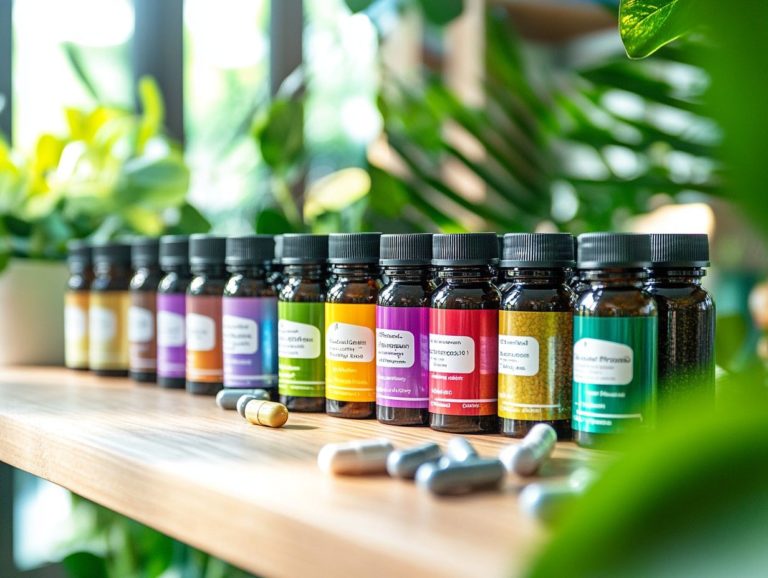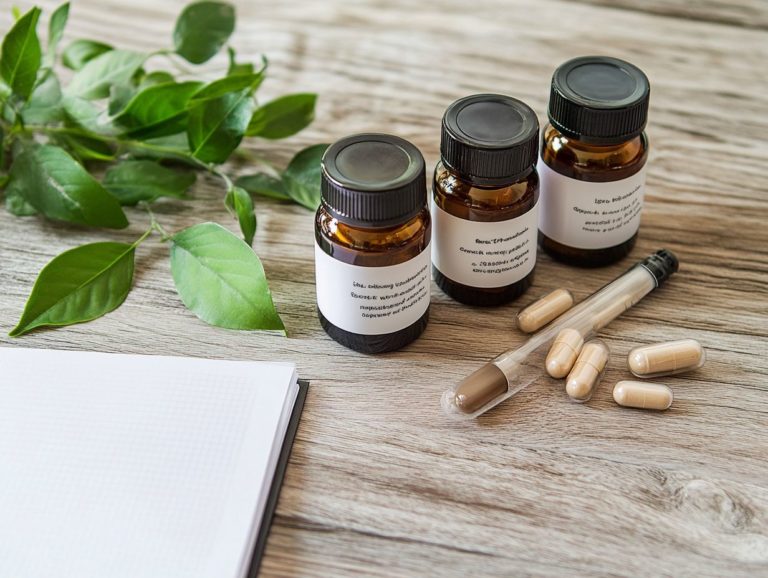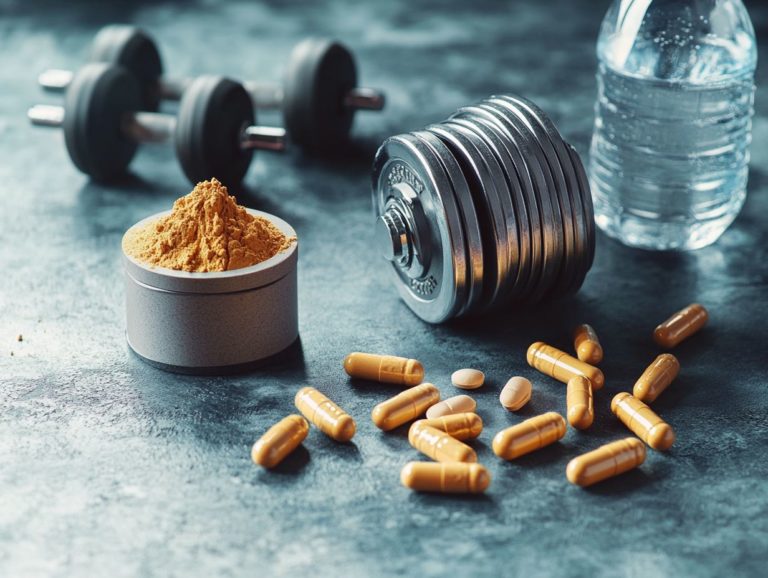5 Dietary Supplements for Reducing Inflammation
Inflammation is your body s natural response to injury or infection. But when it becomes chronic, it can lead to a host of health issues, including heart disease and arthritis. Learn how to fight inflammation with the right foods your health depends on it!
This article delves into five dietary supplements turmeric, omega-3 fatty acids, ginger, vitamin D, and probiotics that may help you reduce inflammation.
Alongside their advantages, you ll discover recommended dosages, potential side effects, and additional natural strategies to promote a healthier, more balanced body.
Explore with us as you uncover effective ways to combat inflammation and enhance your overall well-being.
Contents
- Key Takeaways:
- 1. Turmeric
- 2. Omega-3 Fatty Acids
- 3. Ginger
- 4. Vitamin D
- 5. Probiotics
- What Is Inflammation and How Does It Affect the Body?
- What Are the Common Causes of Inflammation?
- How Can Dietary Supplements Help Reduce Inflammation?
- What Are the Recommended Dosages for These Supplements?
- Are There Any Potential Side Effects of These Supplements?
- What Are Some Other Natural Ways to Reduce Inflammation?
- When Should Someone Consult a Doctor About Inflammation?
- Can These Supplements Help with Chronic Inflammatory Conditions?
- How Long Does It Take to See Results from These Supplements?
- Are There Any Interactions with Other Medications or Supplements?
- How Can One Incorporate These Supplements into Their Diet?
- Frequently Asked Questions
- 1. What are the top 5 dietary supplements for reducing inflammation?
- 2. How does turmeric help in reducing inflammation?
- 3. Can omega-3 fatty acids really help with inflammation?
- 4. Is ginger effective in reducing inflammation?
- 5. How does green tea extract help with inflammation?
- 6. Can resveratrol be used as a dietary supplement for reducing inflammation?
Key Takeaways:
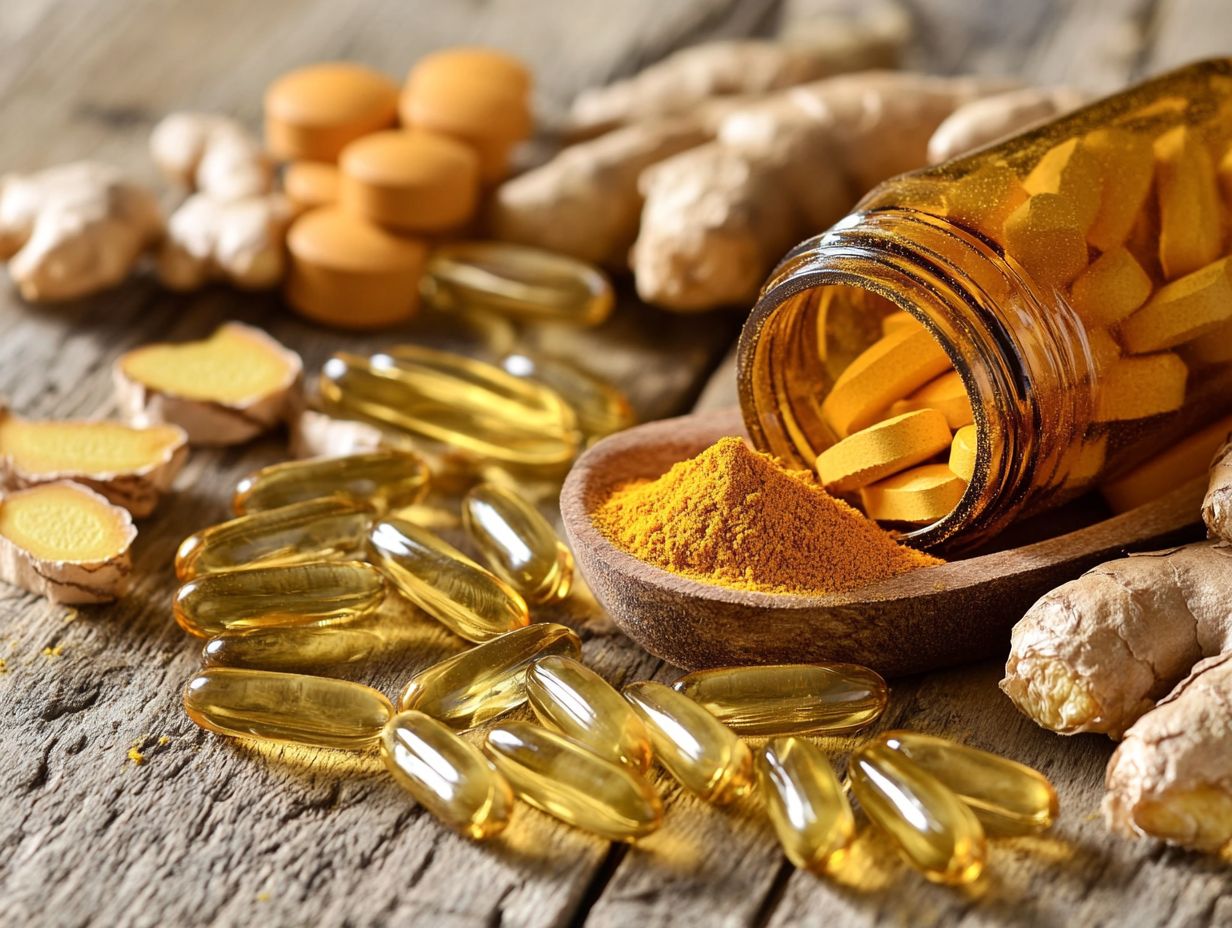
- Turmeric, omega-3 fatty acids, ginger, vitamin D, and probiotics are effective dietary supplements for reducing inflammation.
- Inflammation can be caused by various factors; these supplements can help alleviate symptoms and promote overall health.
- Consult a doctor before taking these supplements, especially if you have a chronic inflammatory condition or are taking other medications or supplements.
1. Turmeric
Turmeric, that vibrant yellow spice from the Curcuma longa plant, is capturing attention for its remarkable anti-inflammatory properties, thanks to its active compound, curcumin. This compound has been extensively researched for its potential to alleviate a range of health conditions linked to chronic inflammation, including arthritis, heart disease, and Alzheimer s disease.
Numerous studies highlight curcumin s effectiveness in reducing inflammatory markers in the body. This makes it an invaluable ally in your health-conscious diet. If you’re looking to incorporate turmeric into your meals, you’ll find it effortlessly blends into curries, smoothies, or even golden milk, enriching your dishes with its warm flavor while delivering significant health benefits.
When compared to other dietary supplements known for their anti-inflammatory effects, such as omega-3 fatty acids and ginger, turmeric truly shines. Its absorption is notably enhanced when paired with black pepper or fat, boosting how well your body can absorb it and amplifying its positive impact on your overall wellness.
2. Omega-3 Fatty Acids
Omega-3 fatty acids, the essential fats found in fish oil and certain plant oils, are renowned for their remarkable ability to reduce inflammation and bolster heart health. This makes them a top choice for those like you who are looking for dietary supplements to combat chronic diseases and enhance immune function.
These healthy fats are primarily sourced from fatty fish such as salmon, mackerel, and sardines, as well as plant-based options like flaxseeds and walnuts. They work wonders by helping your body manage inflammation and promoting cardiovascular well-being.
Research shows that omega-3s lower triglyceride levels, reduce arterial plaque buildup, and decrease blood pressure key factors in preventing heart disease. To reap these benefits, it’s typically recommended that you consume at least two servings of fatty fish each week or consider taking supplements, such as fish oil capsules, which usually provide around 1,000 to 2,000 milligrams of combined EPA and DHA per day.
By incorporating these omega-3 sources into your diet, you can significantly enhance your overall health and reduce the risks associated with chronic inflammation.
Consult with your doctor about these supplements or try incorporating them into your diet today!
3. Ginger
Ginger, a spice and medicinal herb you re likely familiar with, is celebrated for its remarkable anti-inflammatory properties. It is an excellent dietary supplement for managing pain and alleviating various inflammatory conditions, including arthritis and muscle pain.
You can enjoy this versatile root in countless ways fresh, powdered, pickled, or even as essential oil. The active compound gingerol is primarily responsible for its therapeutic effects. Furthermore, there s a growing body of scientific research backing its benefits. Numerous studies indicate that ginger can significantly lower inflammatory markers in your body and enhance your overall well-being.
In traditional medicine, ginger has been a go-to remedy for digestive issues and for easing symptoms associated with colds and flu. Ginger s popularity in dietary supplements reflects the increasing number of individuals seeking natural alternatives to boost their health.
4. Vitamin D
Vitamin D is an essential nutrient crucial for regulating your immune system. It s linked to reduced inflammation, particularly in chronic diseases like autoimmune disorders. This nutrient also influences how your body fights infections, making it a key ingredient in many dietary supplements.
When your vitamin D levels are adequate, you can lower your risk of developing conditions such as heart disease, diabetes, and even some types of cancer. You can obtain vitamin D through sunlight exposure, fatty fish, fortified dairy products, and supplements. This is especially important if you live in areas with limited sunlight.
Make sure to get enough vitamin D! By incorporating vitamin D-rich foods into your diet or considering supplementation, you can significantly improve your health, particularly during winter months when sunlight is in short supply.
5. Probiotics
Probiotics, often celebrated as ‘good bacteria’, are beneficial microorganisms that play a pivotal role in supporting your gut health. They help reduce inflammation and bolster your immune system, making them a sought-after addition to dietary supplements.
These microorganisms come in various strains, with Lactobacillus and Bifidobacterium being among the most studied for their health benefits. Certain strains are particularly effective at alleviating symptoms associated with chronic inflammatory conditions like irritable bowel syndrome and arthritis.
Incorporating probiotics into your diet can be both fun and beneficial! You can opt for high-quality supplements or savor fermented foods such as yogurt, kefir, sauerkraut, and kimchi. By weaving probiotics into your daily meals, you enhance your gut health and contribute to your overall well-being, giving you the power to better manage inflammation and chronic health challenges.
What Is Inflammation and How Does It Affect the Body?
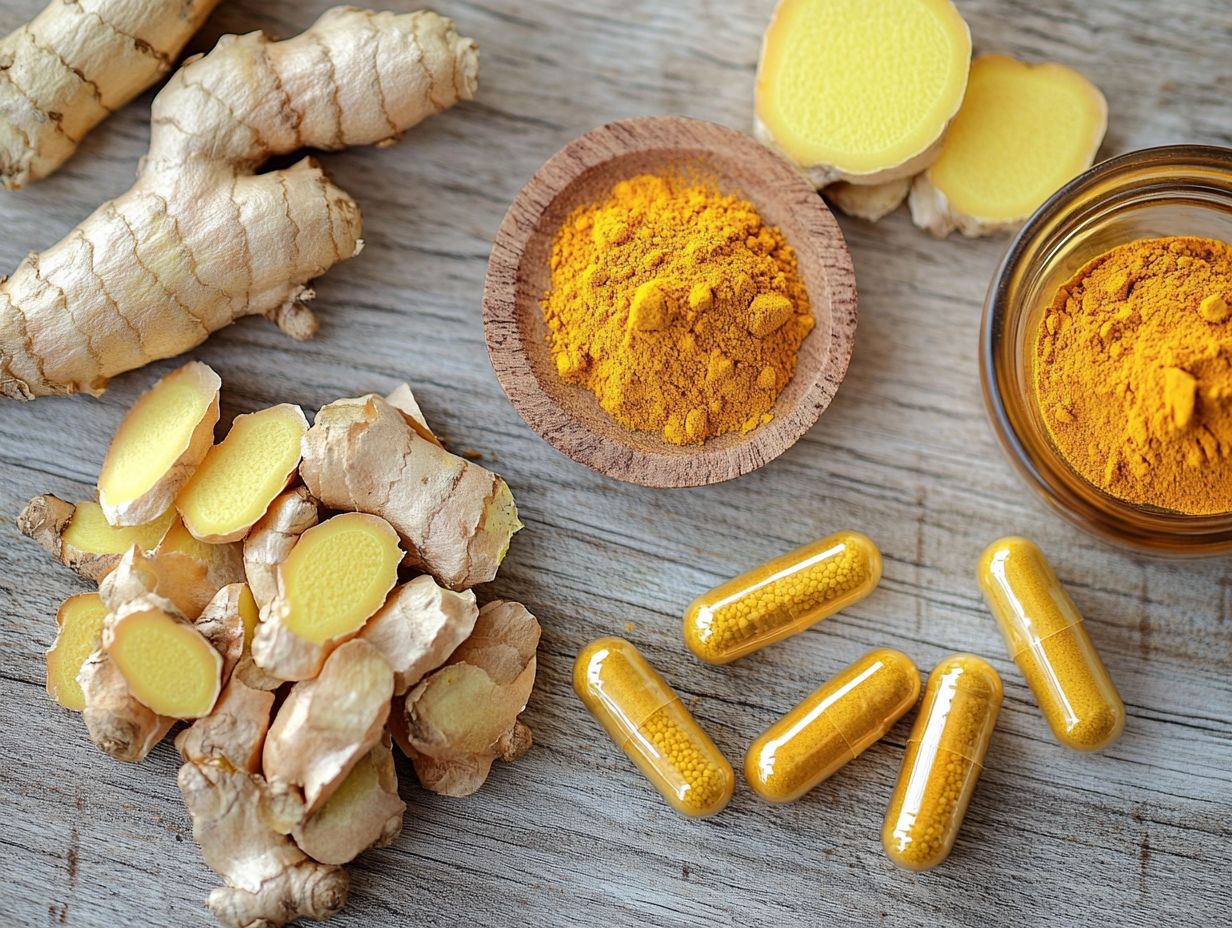
Inflammation is your immune system’s natural response to injury or infection, marked by redness, heat, swelling, and pain. While acute inflammation is beneficial and helps your body heal, chronic inflammation can lead to health issues including autoimmune diseases, heart disease, and even Alzheimer s. This is largely due to the continuous release of cytokines, which are signaling molecules that can lead to inflammation and further tissue damage.
Chronic inflammation can linger subtly, often without obvious symptoms, yet it quietly disrupts your overall health. Instead of resolving the initial issue, your immune system remains on high alert, creating a prolonged state that disrupts your body s balance, leading to negative effects.
Research suggests that chronic inflammation is a key player in the progression of metabolic syndrome, diabetes, and even certain types of cancer. This underscores the crucial importance of managing inflammation effectively to maintain your optimal health.
What Are the Common Causes of Inflammation?
Common causes of inflammation often stem from lifestyle choices you make. These include a poor diet, lack of exercise, and high stress levels, along with factors like obesity and an imbalance between free radicals and antioxidants in your body. These elements play a significant role in how your body responds to both external and internal stressors. This can result in prolonged states of inflammation.
For instance, if your diet is loaded with processed foods and sugars, you could be promoting inflammation by driving up insulin levels and accumulating fat deposits. On the flip side, physical inactivity not only adds to weight gain but also hampers your body s natural ability to keep inflammation in check.
Chronic stress also contributes to inflammation. While it may release hormones like cortisol that initially reduce inflammation, it can ultimately lead to increased inflammatory markers over time.
Understanding and addressing these dietary and lifestyle choices is essential. By managing these factors, you can effectively prevent the escalation of inflammatory processes into chronic diseases, fostering overall health and well-being.
How Can Dietary Supplements Help Reduce Inflammation?
Dietary supplements, such as turmeric, omega-3 fatty acids, ginger, and vitamin D, hold significant promise in your quest to reduce inflammation. Additionally, exploring dietary supplements to combat fatigue can be beneficial. Thanks to their powerful anti-inflammatory properties, they can offer relief for those grappling with health conditions like arthritis or heart disease, which are exacerbated by chronic inflammation.
Research reveals that curcumin, the active compound in turmeric, effectively inhibits pro-inflammatory enzymes and cytokines. A study published in the journal Molecules underscores its vital role in modulating inflammatory pathways. Omega-3 fatty acids, primarily sourced from fish oil, are celebrated for their capacity to decrease the production of inflammatory prostaglandins, as detailed in comprehensive reviews found in The American Journal of Clinical Nutrition.
Meanwhile, ginger, particularly its key component gingerol, has showcased notable anti-inflammatory effects. Studies featured in The Journal of Alternative and Complementary Medicine support these claims. Maintaining adequate vitamin D levels is essential for immune health. Deficiencies have been linked to heightened inflammation, according to findings in The Journal of Clinical Endocrinology & Metabolism.
In combination, these supplements provide a powerful way to tackle inflammation head-on! This approach presents a compelling alternative for many seeking relief.
What Are the Recommended Dosages for These Supplements?
Dosages differ for everyone, but here are some general guidelines. You should consider taking turmeric (curcumin) at around 500-2000 mg daily, omega-3 fatty acids at 250-500 mg of combined EPA and DHA, and vitamin D typically between 600 to 2000 IU daily to reap optimal health benefits.
It’s essential to keep in mind that these numbers are just a starting point and may not be suitable for everyone. Factors such as your age, weight, and any pre-existing medical conditions greatly influence your actual requirements.
Always talk to a healthcare professional, ideally a Registered Dietitian Nutritionist, before starting any supplements! They can provide you with personalized advice tailored to your unique health profile, ensuring you receive the optimal dosages that promote overall well-being while minimizing any potential risks associated with improper use.
Stay informed about your health and take actionable steps toward reducing inflammation!
Are There Any Potential Side Effects of These Supplements?
While dietary supplements like turmeric, omega-3 fatty acids, ginger, and vitamin D are generally safe, they can cause side effects for some individuals. These may include gastrointestinal discomfort, allergic reactions, or interactions with certain medications. This highlights why you should speak with a healthcare provider before starting any supplement regimen.
For instance, turmeric can occasionally cause nausea or diarrhea, especially in high doses. Omega-3 fatty acids may increase the risk of bleeding, particularly if you are taking medications that prevent blood clots. Although ginger is known for its anti-nausea effects, it can also lead to heartburn in some people. Additionally, vitamin D may interact with steroids, affecting their effectiveness.
It’s wise to monitor your body’s responses closely. Discuss any pre-existing health conditions or medications with a medical professional to ensure a safe and beneficial experience with supplements.
What Are Some Other Natural Ways to Reduce Inflammation?
In addition to dietary supplements, you can explore various natural methods to reduce inflammation effectively. Start by adopting a balanced diet that emphasizes fruits, vegetables, and omega-3 fatty acids. You might also consider 5 dietary supplements for stress relief. Regular exercise is also essential, as is managing your stress levels.
Don’t forget to include anti-inflammatory foods like ginger and turmeric in your daily meals. By integrating these lifestyle changes into your routine, you can create a holistic approach to managing inflammation.
A well-rounded diet delivers essential nutrients and enhances your overall health. Consistent physical activity improves circulation and strengthens your immune system.
Also, practicing mindfulness techniques such as yoga or meditation can significantly reduce the stress hormones that contribute to inflammation. Staying well-hydrated and ensuring you get adequate sleep are vital components of this lifestyle, as both are key to recovery and maintaining balance in your body.
When Should Someone Consult a Doctor About Inflammation?
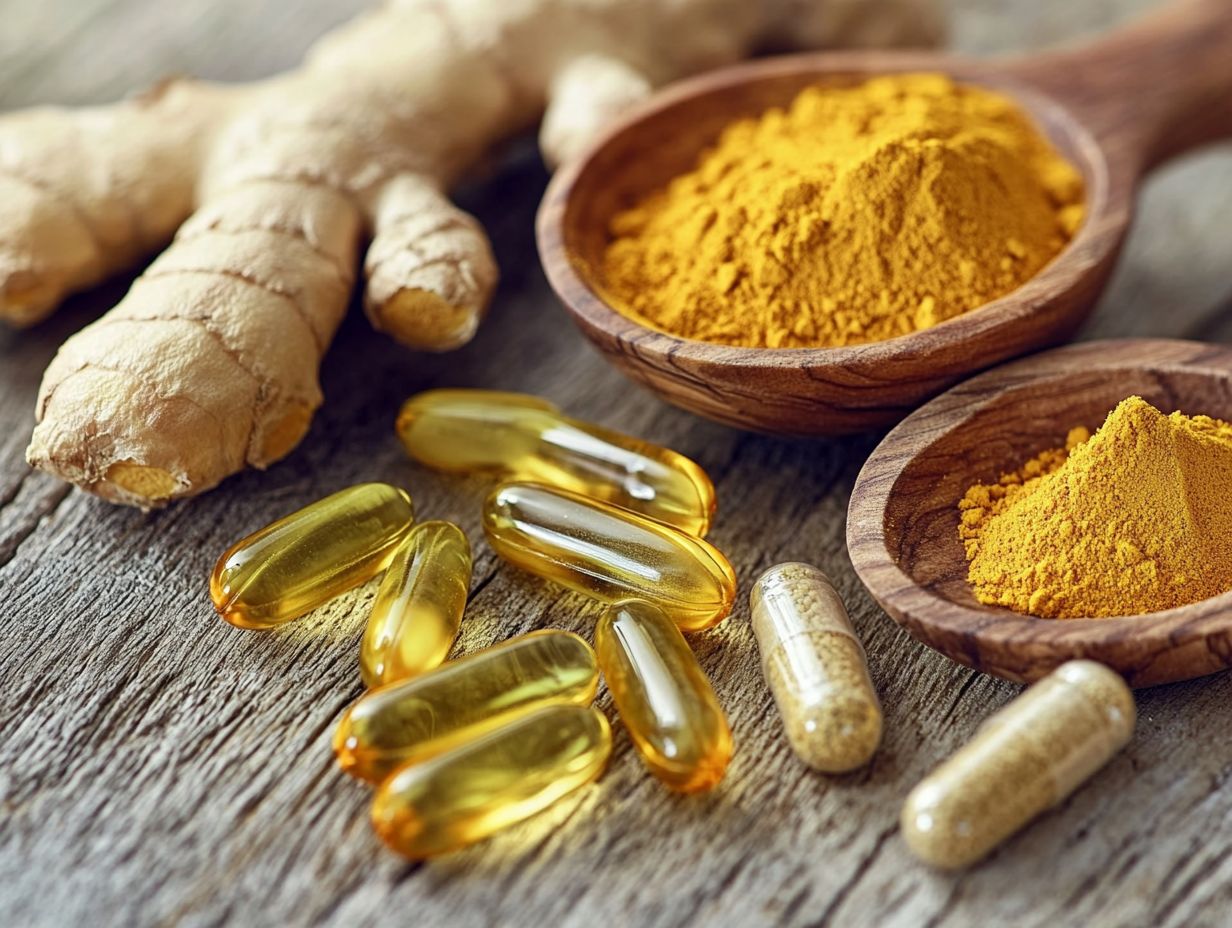
Don’t wait! Take charge of your health by consulting a doctor about inflammation if you experience persistent symptoms like prolonged pain, swelling, or redness. This is especially important if these symptoms are linked to chronic diseases or autoimmune disorders, as professional diagnosis and treatment options may be necessary.
Spotting these signs early can greatly improve your health outcomes, as untreated inflammation often worsens underlying conditions. A professional evaluation is essential to differentiate between temporary issues and more serious health concerns.
Stay alert to symptoms such as fatigue, fever, or joint stiffness, as they may indicate a deeper problem. Seeking medical advice promptly not only aids in proper diagnosis but also ensures you receive the most effective and personalized treatment plans. This approach allows for better management of inflammation and enhances your overall well-being.
Can These Supplements Help with Chronic Inflammatory Conditions?
Numerous dietary supplements, such as turmeric, omega-3 fatty acids, and vitamin D, may help in managing chronic inflammatory conditions like arthritis, heart disease, and autoimmune diseases. They offer a complementary approach to traditional treatments that you might find appealing.
Recent studies have shown these supplements to be effective, revealing significant reductions in inflammation markers among participants. For example, a clinical trial focusing on omega-3 fatty acids showcased a remarkable decrease in joint pain and stiffness in individuals with rheumatoid arthritis.
Research on turmeric has highlighted its impressive properties that reduce inflammation, demonstrating better symptom management for those dealing with inflammatory bowel disease. Vitamin D deficiency has been linked to heightened autoimmune activity, and supplementation has shown promise in curbing flare-ups.
Incorporating these top supplements for heart health into your regimen could play a pivotal role in the holistic management of chronic inflammation. Consider adding these supplements to your routine today for better health!
How Long Does It Take to See Results from These Supplements?
The timeline for seeing results from dietary supplements like turmeric, omega-3 fatty acids, and ginger can vary significantly. You might notice improvements in just a few weeks of consistent use, depending on the specific supplement and your unique health status.
Several factors influence how quickly and effectively these supplements work. These include dosage, the quality of the product, and your lifestyle choices, such as diet and exercise. If you re committed to a healthy lifestyle, you may experience benefits sooner than someone whose eating habits counteract the supplement s effects.
Your individual conditions, like existing health issues or metabolic rates, also play a key role in determining when you ll see noticeable results. Stay patient and keep using the supplements regularly for the best results. Regular consultations with a healthcare provider can significantly enhance the effectiveness of these dietary aids.
Are There Any Interactions with Other Medications or Supplements?
Certain dietary supplements, such as turmeric, omega-3 fatty acids, and vitamin D, can interact with medications or other supplements. This can impact their effectiveness or increase the risk of side effects. Always consult a healthcare professional before combining them.
For instance, turmeric is known for its anti-inflammatory benefits but can interact with blood thinners (medications that thin the blood). If you re on such medications, approach supplementation with caution. Omega-3 fatty acids may amplify the effects of anticoagulants, raising the risk of bleeding. Vitamin D is crucial for bone health but can interfere with certain weight loss medications, altering their effectiveness.
Ready to add these supplements to your routine? It s wise to disclose all current medications to your doctor. They can provide personalized guidance on appropriate dosages and timing, helping you navigate any potential adverse interactions with ease.
How Can One Incorporate These Supplements into Their Diet?
Incorporating dietary supplements like turmeric, omega-3 fatty acids, and ginger into your diet can be simple and enjoyable. You can effortlessly add turmeric to your meals, take omega-3 capsules, or use ginger in teas and cooking, enhancing your overall health while reducing inflammation. For more options, consider exploring 5 dietary supplements to support digestive health.
To maximize the benefits of these supplements, consider blending turmeric into your smoothies or adding it to hearty soups and stews. For omega-3s, don t just rely on capsules; sprinkle chia seeds into your oatmeal or salad dressings for an extra nutritional boost. Ginger elevates the flavor of stir-fries and marinades, or you can brew a soothing ginger tea by steeping fresh slices in hot water.
With these simple adjustments, you can weave these powerful supplements into your daily eating habits, ensuring your approach to wellness is both delicious and healthful.
Frequently Asked Questions
1. What are the top 5 dietary supplements for reducing inflammation?
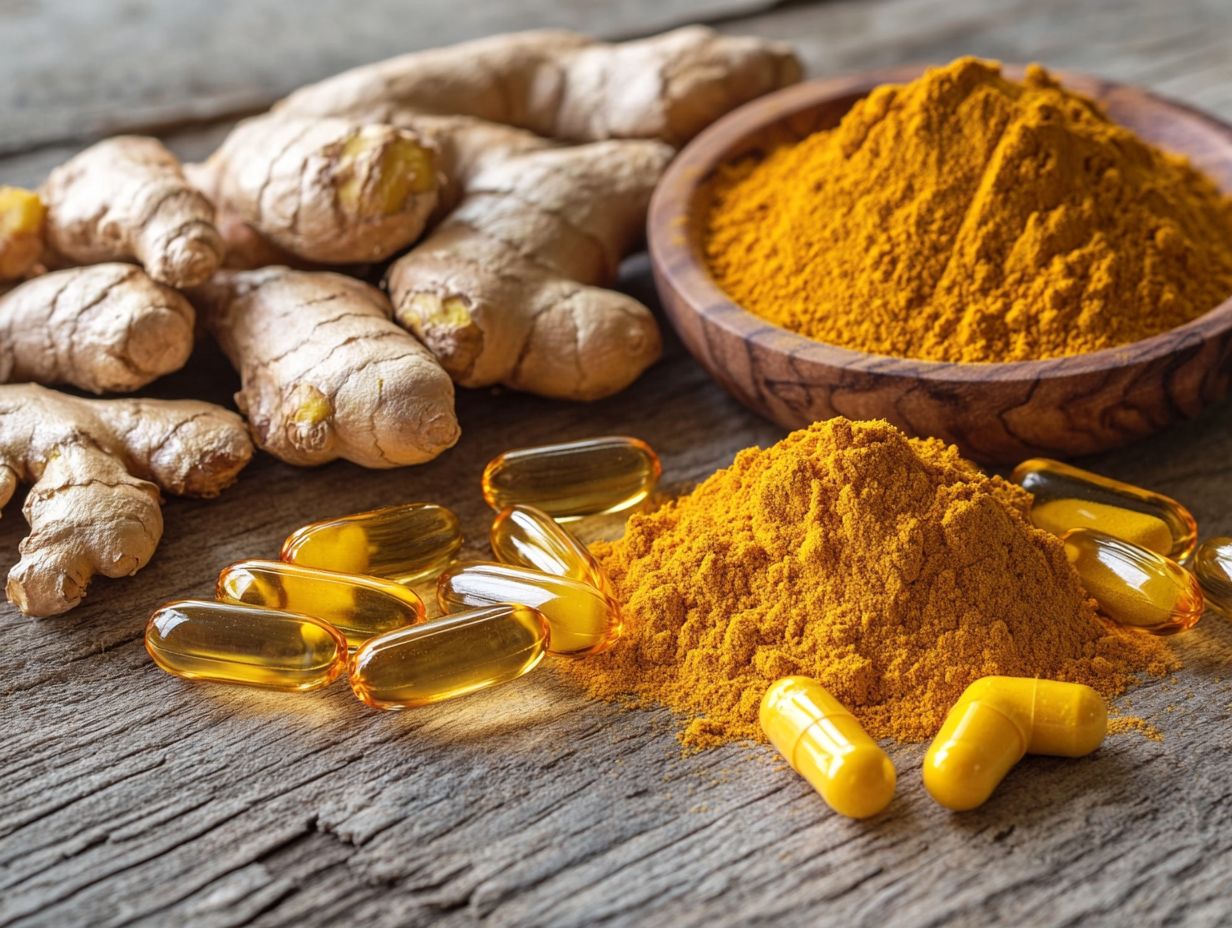
The top 5 dietary supplements for reducing inflammation are turmeric, omega-3 fatty acids, ginger, green tea extract, and resveratrol. In addition to these, incorporating herbs for reducing inflammation can provide additional benefits, as these supplements have anti-inflammatory properties and can help alleviate symptoms of inflammation in the body.
2. How does turmeric help in reducing inflammation?
Turmeric contains a compound called curcumin, which has strong anti-inflammatory effects. It can inhibit the production of inflammatory chemicals in the body and also has antioxidant properties that help reduce oxidative stress (harmful damage to cells) and inflammation.
3. Can omega-3 fatty acids really help with inflammation?
Yes, omega-3 fatty acids, specifically EPA and DHA, have been shown to reduce inflammation in the body by decreasing the production of inflammatory molecules. They also help improve heart health and brain function.
4. Is ginger effective in reducing inflammation?
Discover how ginger, a powerful natural remedy, has been celebrated for centuries for its remarkable anti-inflammatory properties.
It contains gingerols and shogaols, which reduce inflammation and pain in conditions like osteoarthritis and rheumatoid arthritis.
5. How does green tea extract help with inflammation?
Green tea extract is rich in antioxidants called catechins. These compounds have strong anti-inflammatory effects and can help reduce inflammation and oxidative stress, key contributors to chronic diseases.
Antioxidants are substances that help fight damage in the body caused by free radicals. Free radicals can lead to oxidative stress, a condition that contributes to inflammation and chronic illnesses.
6. Can resveratrol be used as a dietary supplement for reducing inflammation?
Resveratrol is a compound found in grapes and red wine. It has potent anti-inflammatory effects that may decrease inflammation and help prevent chronic diseases like heart disease, diabetes, and cancer.

